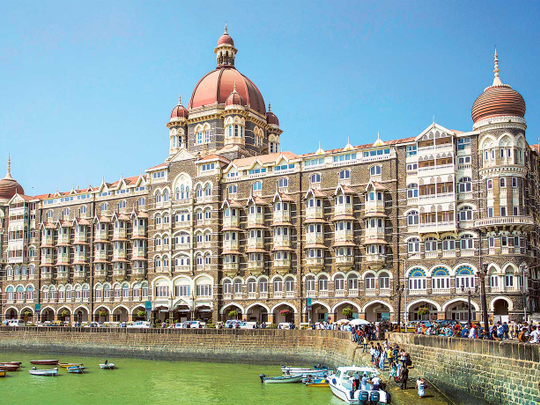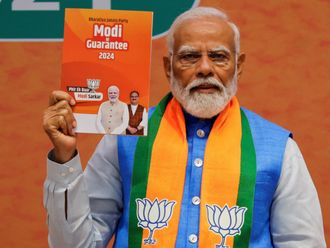
Mumbai: In India, where corruption is a fact of life, the Tata Group — a powerhouse conglomerate that makes Land Rovers, operates the historic Pierre Hotel in New York and sells Tetley tea — has been held up as the exception to the rule.
Its patriarch, Ratan Tata, 78, is a revered figure in India, a cross between Warren Buffett and Bill Gates whom even schoolchildren know and look up to as Mr. Clean — the billionaire whose family built its name in part on zero tolerance for corruption.
His company symbolises the role an ascendant India sees for itself on the global stage. In 2010 Tata arranged a $50 million (Dh183 million) donation to Harvard Business School, the school’s largest gift from an international donor, and its dean sits on the board of the empire’s umbrella organisation, Tata Sons. Tata has been knighted by Queen Elizabeth.
Now, however, Tata is caught up in a nasty public fight for control of the business — with the man he had chosen to succeed him as chairman. The company finds itself defending against serious allegations of wrongdoing.
Some of the claims have been raised by his chosen successor, Cyrus Mistry. Tata ousted Mistry in late October, saying it was necessary because “the board of Tata Sons lost confidence in him and in his ability to lead the Tata Group in the future.”
Mistry, 48, told Tata’s board in a letter that an internal audit indicated that its airline joint venture, AirAsia, had made more than $3 million in “fraudulent transactions” with two companies. In recent days, India’s Directorate of Enforcement has started an investigation into the AirAsia payments. The directorate did not respond to requests for comment.
“Never before has the Tata Group, including the philanthropic objectives of the Tata Trusts, been in jeopardy to this extent and scale,” Mistry said in a public statement this month. He said he was fighting “to protect the Tata Group from capricious decision-making by the interim chairman,” a reference to Tata.
Separately, on Friday, a crusading member of India’s parliament, Subramanian Swamy, called in a court complaint for an investigation into allegations from a government report that Tata in 2008 used a front company to apply for a telecommunications license, potentially circumventing the limits on the number of licenses one investor could hold. This is alleged to have happened at a time of furious manoeuvring among companies trying to win the rights to offer cell phone service in India — a battle that resulted in one of India’s biggest corruption scandals ever.
Ultimately the scandal helped sweep India’s founding political party, the Congress party, from power in an epic defeat.
India’s Serious Fraud Investigation Office recommended prosecuting Tata in 2013. For reasons that are not clear, the government did not file a case in court. Officials at the fraud office and at the Central Bureau of Investigation (CBI), the federal agency responsible for bringing cases, did not respond to requests for comment.
The fraud office documents, which Swamy filed as part of his court complaint, say that the Tata Group invested $250 million in eight subsidiaries of a real estate firm, Unitech — a sum roughly equivalent to the telecom license application fee. Unitech used that money to apply for a license on Tata’s behalf, the report from the government’s fraud office said.
A Tata spokesman said the company made “a bona fide real estate deal” with Unitech unrelated to telecom licenses, adding that “no evidence was found which could be attributed to any criminality.”
Unitech did not respond to requests for comment.
According to several people close to Mistry, the relationship between him and Tata soured in part because Mistry had begun reining in some favours that the company had previously extended to Tata’s personal friends.
In one instance, after Mistry raised the issue, the Tata board explored starting legal proceedings against C. Sivasankaran, a long-time friend and close business associate of Tata, to try to recover $100 million the company said it was owed from a telecom deal. Sivasankaran also had been renting a 5,300-square-foot penthouse for $11,000, less than half the market rent, from the company, according to correspondence reviewed by The Times. Mistry raised his rent to the market rate.
Sivasankaran, in an interview, said he was a friend of Tata’s. He said, though, that he had suffered financially from the investment and had no intention of paying back the $100 million he owed.
“I don’t want to pay it because Tata has not managed the company properly,” he said. “Siva is alleging the Tata Group does not have management skills,” Sivasankaran said, referring to himself in the third person.
He also confirmed that he was ousted from the luxury apartment. Sivasankaran said he had a long-term contract to stay there, so he could have fought to stay, but decided to go quietly.
Another issue at Tata involved no-bid dredging, shipping and barge contracts granted to companies belonging to another of Tata’s long-time friends, Mehli Mistry, according to three people who have reviewed company documents. (He and Cyrus Mistry, the ousted Tata executive, are cousins.) Cyrus Mistry allowed the contracts to be put up for bid once they expired, according to the people who have reviewed the documents.
A Tata Group spokesman referred questions to Tata Power, the unit that made the contracts. Tata Power did not respond to requests for comment.
Mehli Mistry, through a lawyer, said the contracts were not the result of his friendship with Tata, and disputed that they were not fairly valued.
From a corporate perspective, the most consequential allegations regarding Tata and the group are those contained in the 33-page report from the Serious Fraud Investigation Office asserting that Tata’s group was the real applicant behind a telecom license secured by Unitech, the New Delhi real estate company.
A decade ago, India pried open its notoriously dysfunctional telecom market. In the days before deregulation, it could take a customer years just to get a new phone number. People would hang on to their phone lines like family jewels and hand them down to relatives.
Against that backdrop, investors saw a once-in-a-generation opportunity to build an Indian phone empire. But applicants could seek only one license. And the Tata Group had already applied for a different one.
The report says that Tata, “desperate to acquire the license,” used Unitech as its front in pursuit of a second license.
Unitech was one of the eight companies granted licenses in 2008. But the Supreme Court later ruled all the licenses illegal, in part because government investigations said that the licensing fee paid by the companies was substantially below market rates.
Fourteen people — including India’s former telecom minister and several Unitech officials — have been on trial in a special court on charges of cheating the government by underselling the licenses. A verdict is expected early next year. All have said they are not guilty.
Tata’s friend Mehli Mistry maintained a lengthy financial relationship with the Tata Group. Over the last two decades, his companies were granted contracts for dredging, barging and shipping by Tata Power, often renewing them without a bidding process.
But after Cyrus Mistry took over, Tata Power put Mehli Mistry’s contracts out to bid. Other companies won those contracts, according to two people familiar with the bidding process.
Mistry was so disappointed at losing the contracts that he sent a message this year to Cyrus Mistry through a family member, people close to Cyrus Mistry said. A person familiar with the message said Mehli Mistry told Cyrus Mistry to stop interfering in his contracts or he would take steps to defend himself.
People close to Cyrus Mistry say he thinks his ouster was, in part, Mehli Mistry’s retaliation. In his letter to the board, Cyrus Mistry wrote, “I had to ease out hangers-on.”
Mehli Mistry, his lawyer said, “emphatically denied” sending any message regarding contracts to Cyrus Mistry and played no role in his ouster.












